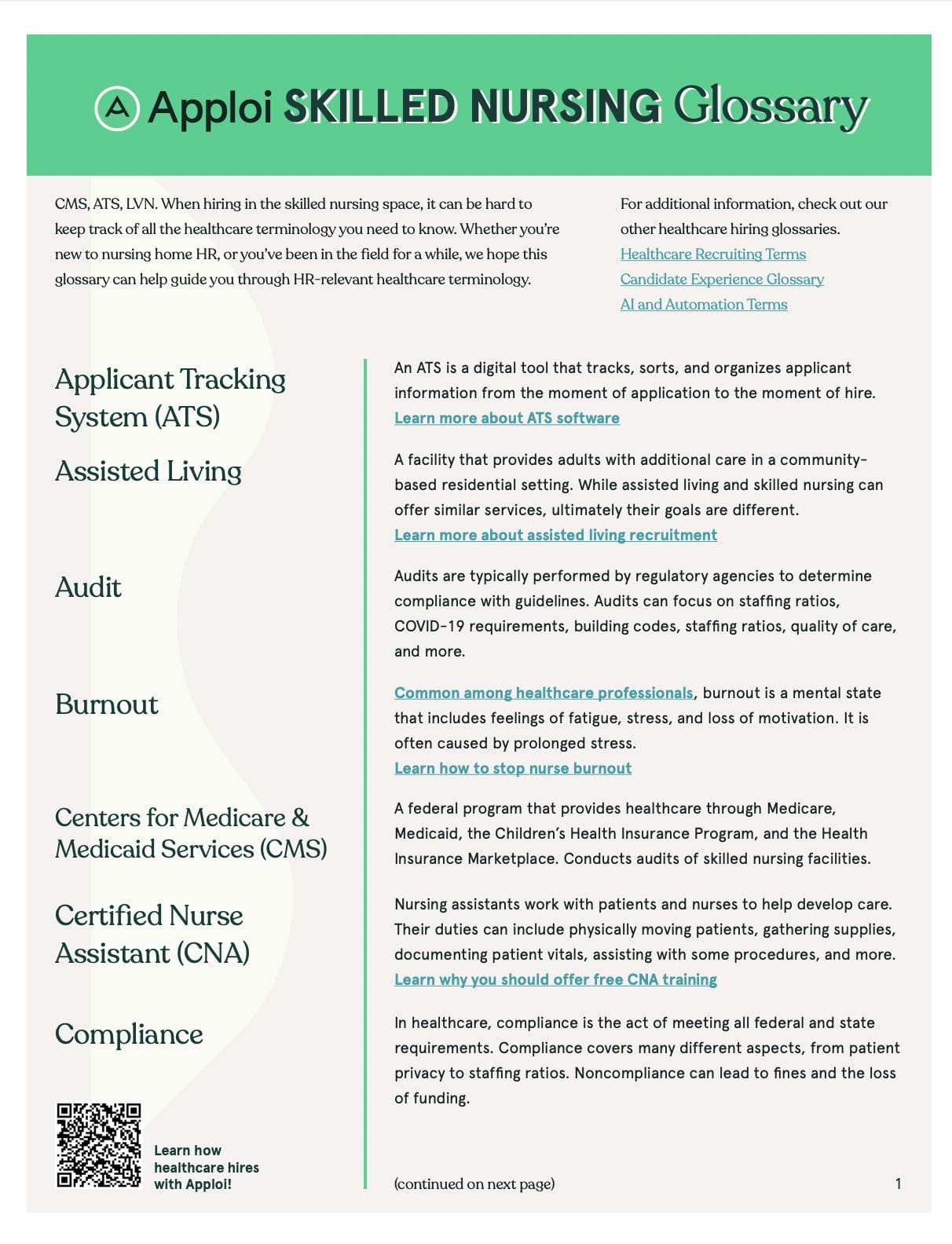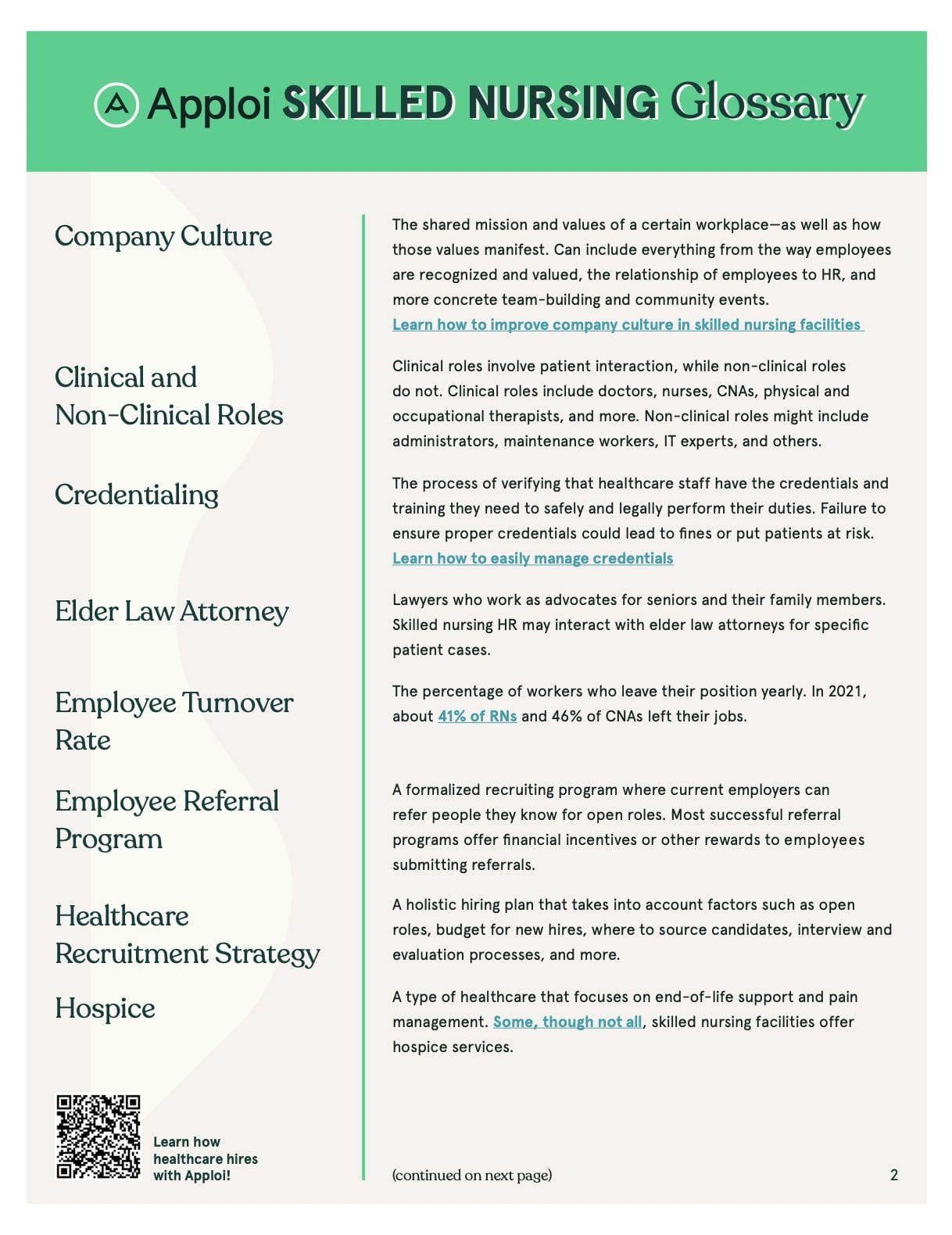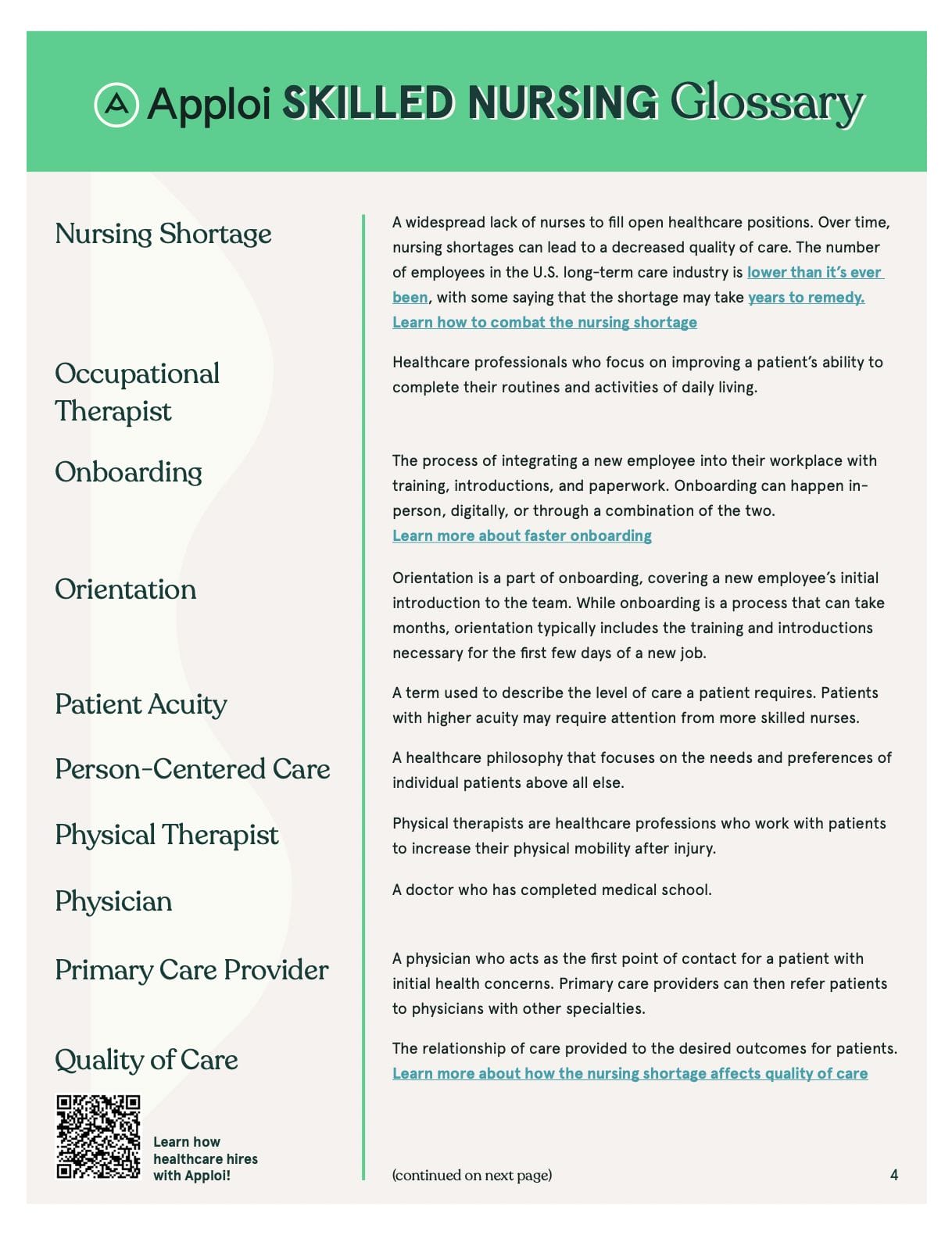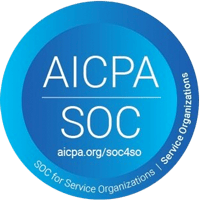Healthcare Terminology to Know: Skilled Nursing Glossary
CMS, ATS, LVN. When hiring in the skilled nursing space, it can be hard to keep track of all the healthcare terminology you need to know. Use this handy glossary to train new hires as they begin to navigate healthcare hiring.
For additional information, check out our other healthcare hiring glossaries.
Healthcare Recruiting Terms
Candidate Experience Glossary
AI and Automation Terms

In This Series
- Staffing Guide for Skilled Nursing Facilities
- Seven Ways to Improve Your Skilled Nursing Orientation
- Nursing Home Hiring: Tips for Recruiting 7 Common Roles
- Healthcare Terminology for Skilled Nursing HR
- Skilled Nursing Retention: 10 Tips for Reducing Turnover
- Skilled Nursing Compliance Q&A with Healthcare Law Attorneys
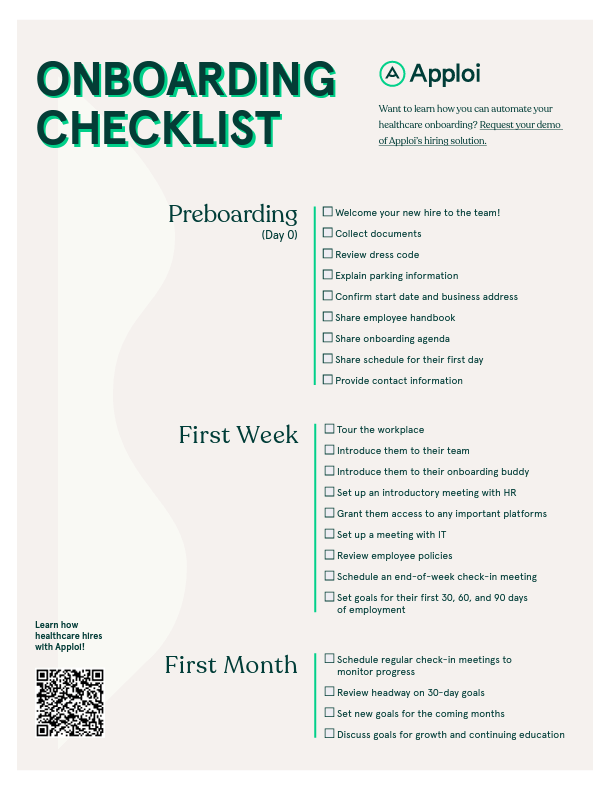
FREE INTERACTIVE ONBOARDING CHECKLIST
Specifically designed for Skilled Nursing Facility Roles
FREE PRINTABLE GLOSSARY
Download your free glossary to use later in learning
Skilled Nursing Glossary: Healthcare Hiring Terminology
Applicant Tracking System (ATS)
An ATS is a digital tool that tracks, sorts, and organizes applicant information from the moment of application to the moment of hire.
Assisted Living
A facility that provides adults with additional care in a community-based residential setting.
While assisted living and skilled nursing can offer similar services, ultimately their goals are different.
Audit
Audits are typically performed by regulatory agencies to determine compliance with guidelines. Audits can focus on staffing ratios, COVID-19 requirements, building codes, staffing ratios, quality of care, and more.
Burnout
Common among healthcare professionals, burnout is a mental state that includes feelings of fatigue, stress, and loss of motivation. It is often caused by prolonged stress.
Centers for Medicare & Medicaid Services (CMS)
A federal program that provides healthcare through Medicare, Medicaid, the Children’s Health Insurance Program, and the Health Insurance Marketplace. Conducts audits of skilled nursing facilities.
Certified Nurse Assistant (CNA)
Nursing assistants work with patients and nurses to help develop care. Their duties can include physically moving patients, gathering supplies, documenting patient vitals, assisting with some procedures, and more.
Compliance
In healthcare, compliance is the act of meeting all federal and state requirements. Compliance covers many different aspects, from patient privacy to staffing ratios. Noncompliance can lead to fines and the loss of funding.
Company Culture
The shared mission and values of a certain workplace—as well as how those values manifest. Can include everything from the way employees are recognized and valued, the relationship of employees to HR, and more concrete team-building and community events.
Clinical and Non-Clinical Roles
Clinical roles involve patient interaction, while non-clinical roles do not. Clinical roles include doctors, nurses, CNAs, physical and occupational therapists, and more. Non-clinical roles might include administrators, maintenance workers, IT experts, and others.
Credentialing
The process of verifying that healthcare staff have the credentials and training they need to safely and legally perform their duties. Failure to ensure proper credentials could lead to fines or put patients at risk.
Elder Law Attorney
Lawyers who work as advocates for seniors and their family members. Skilled nursing HR may interact with elder law attorneys for specific patient cases.
Employee Turnover Rate
The percentage of workers who leave their position yearly. In 2021, about 41% of RNs and 46% of CNAs left their jobs.
Employee Referral Program
A formalized recruiting program where current employers can refer people they know for open roles. Most successful referral programs offer financial incentives or other rewards to employees submitting referrals.
Healthcare Recruitment Strategy
A holistic hiring plan that takes into account factors such as open roles, budget for new hires, where to source candidates, interview and evaluation processes, and more.
Hospice
A type of healthcare that focuses on end-of-life support and pain management. Some, though not all, skilled nursing facilities offer hospice services.
Human Capital Management (HCM) Software
Technology that allows for easier management of recruiting, hiring, and employee management. Unlike an ATS (applicant tracking system), HCM software can cover an employee’s needs from first contact to the time when they leave the company.
In-House Training Program
This is a form of training that involves use of a company’s own resources, training materials, and administration. A common form of in-house training in healthcare is CNA certification.
Licensed Practical Nurse (LPN) and Licensed Vocational Nurse (LVN)
Nurses who provide essential care to patients and assist doctors and registered nurses. Those interested in becoming LPNs and LVNs can take an accredited practical nursing certificate program, usually around a year long.
Memory Care
A form of specialized care and attention offered to patients struggling with dementia, Alzheimer’s, and other memory issues. As of 2020, almost half (48%) of residents in skilled nursing facilities are living with some form of dementia.
Mission Statement
A statement that covers the aims and objectives of a company. A mission statement can also cover philosophies of hiring and providing care, core values, and long-term plans.
Non-Certified Nursing Assistant
Non-certified nursing assistants are employees hired to complete tasks despite not having formal CNA training. These workers are often hired temporarily, with the caveat that they must complete training in order to continue their employment.
Nurse Practitioner
An advanced practice registered nurse, typically with more training and knowledge than other RNs. All states currently require a master’s degree in nursing in order to work as an NP.
Nurse Visa
Any visa used to hire nurses internationally. While there’s no visa reserved specifically for nurses, healthcare employers commonly use H1-A, H1-B, J-1, EB-3, and TN visas.
Nursing Shortage
A widespread lack of nurses to fill open healthcare positions. Over time, nursing shortages can lead to a decreased quality of care. The number of employees in the U.S. long-term care industry is lower than it’s ever been, with some saying that the shortage may take years to remedy.
Occupational Therapist
Healthcare professionals who focus on improving a patient’s ability to complete their routines and activities of daily living.
Onboarding
The process of integrating a new employee into their workplace with training, introductions, and paperwork. Onboarding can happen in-person, digitally, or through a combination of the two.
Orientation
Orientation is a part of onboarding, covering a new employee’s initial introduction to the team. While onboarding is a process that can take months, orientation typically includes the training and introductions necessary for the first few days of a new job.
Quality of Care
The relationship of care provided to the desired outcomes for patients.
Patient Acuity
A term used to describe the level of care a patient requires. Patients with higher acuity may require attention from more skilled nurses.
Person-Centered Care
A healthcare philosophy that focuses on the needs and preferences of individual patients above all else.
Physical Therapist
Physical therapists are healthcare professions who work with patients to increase their physical mobility after injury.
Physician
A doctor who has completed medical school.
Primary Care Provider
A physician who acts as the first point of contact for a patient with initial health concerns. Primary care providers can then refer patients to physicians with other specialties.
Recruitment Marketing
The range of strategies that a company uses to find and attract candidates. Recruitment marketers use landing pages, advertisements, job postings, social media, and more to promote awareness of open positions and drive candidates to apply.
Registered Nurse (RN)
A nurse who has received training and certification necessary according to state guidelines for registered nurses. RN’s provide patient care and assist doctors.
Retention / Turnover
Turnover is the number of employees that leave a company every year. Retention, on the other hand, is the ability of a company to prevent turnover and continually employ workers.
Resident
A long-term patient at a skilled nursing or assisted living facility.
Staffing
The process of recruiting, hiring, and placing new hires within a facility.
Staffing Agency
An external organization that matches job seekers with potential employers for a fee.
Staffing Ratio
The ratio of clinical staff to patients. Most states have specific guidelines on mandatory staffing ratios for skilled nursing facilities.
Survey
A list of questions meant to better understand certain factors. Surveys can be used to assess employee engagement, applicant experience, onboarding and orientation effectiveness, and resident satisfaction.
Tuition Assistance / Reimbursement
A tuition reimbursement program involves employers financing some or all of an employee’s educational costs In one survey, 81% of employees stated that a tuition assistance program would decrease their chances of leaving an employer.
Travel Nurse
Nurses who are deployed by agencies to fill staffing shortages in places of need. The demand for travel nurses during the pandemic has caused their salaries to increase dramatically.
FREE PRINTABLE GLOSSARY
Download your free glossary for later reference
Better Hiring With Apploi
Interested in learning more about how you can recruit, hire, and onboard healthcare staff quickly? Contact us today for a free demo of our end-to-end talent management solution.
In This Series
- Staffing Guide for Skilled Nursing Facilities
- Seven Ways to Improve Your Skilled Nursing Orientation
- Nursing Home Hiring: Tips for Recruiting 7 Common Roles
- Healthcare Terminology for Skilled Nursing HR
- Skilled Nursing Retention: 10 Tips for Reducing Turnover
- Skilled Nursing Compliance Q&A with Healthcare Law Attorneys

